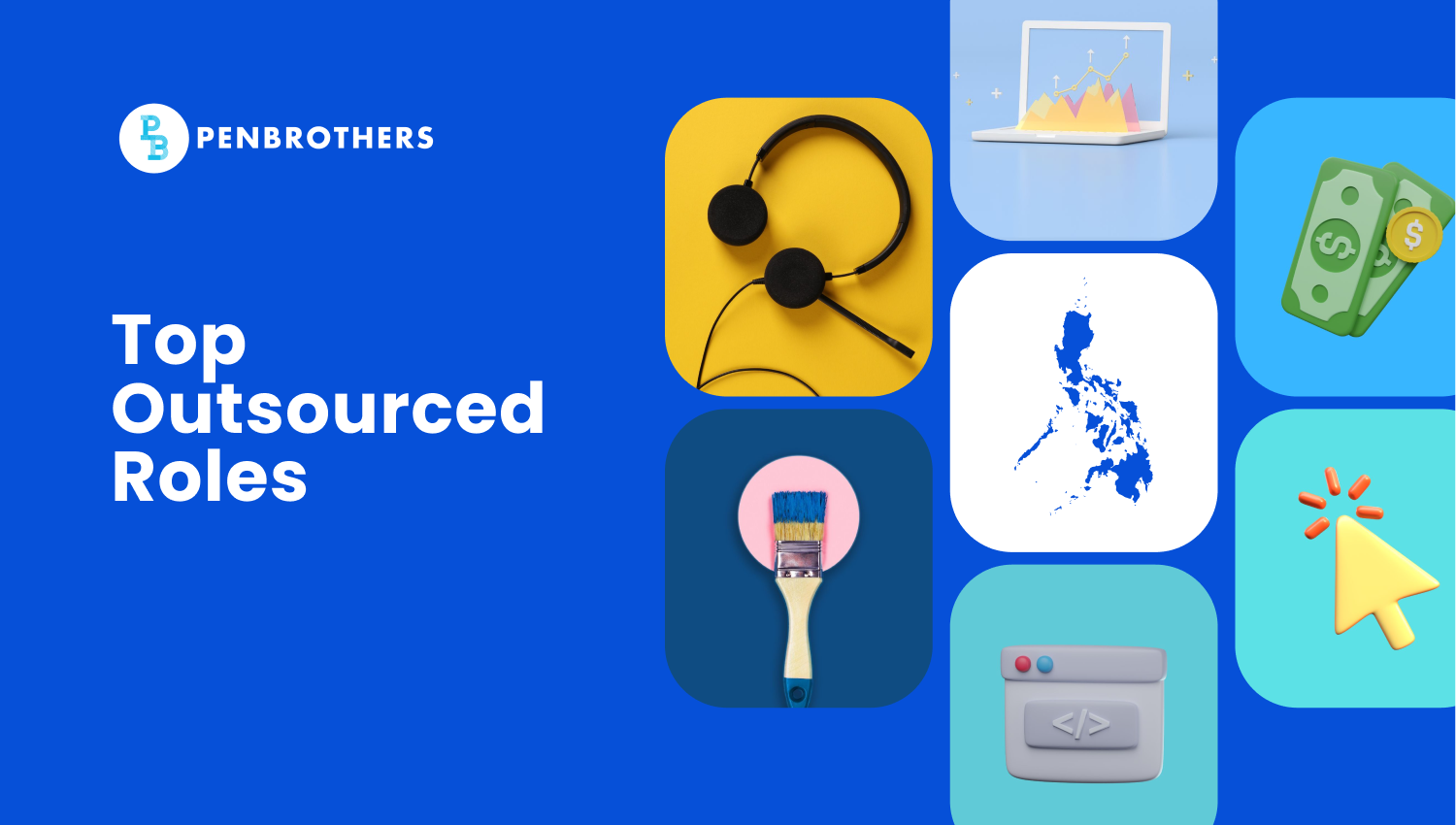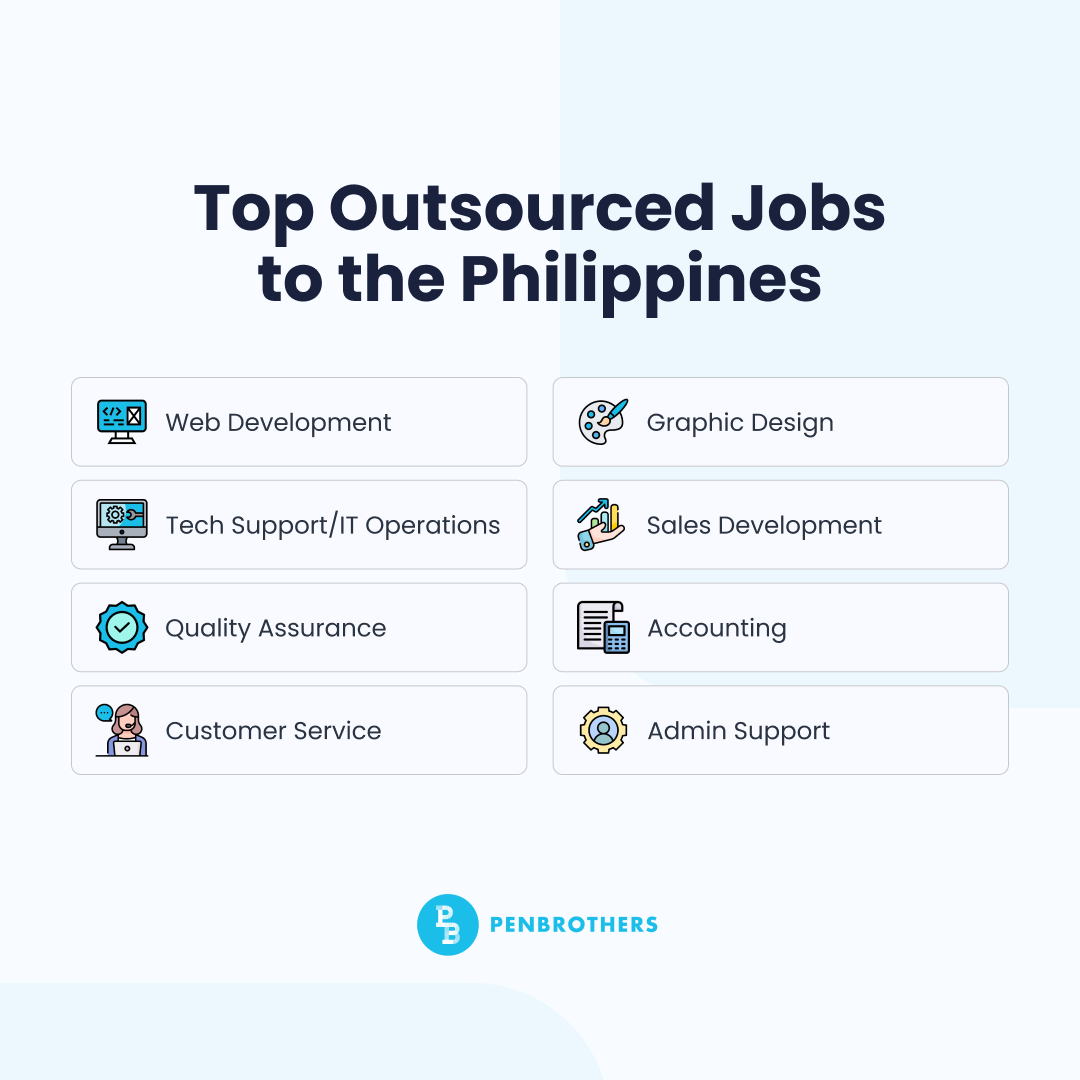What's Inside?
Top Outsourced Jobs to the Philippines

The Philippine outsourcing industry has grown by up to 10% per year, employing at least 1.3 million workers and generating $29.5 billion in revenue, comprising 7.5% of the country’s gross domestic product (GDP).
No wonder the Philippines is one of the 10 most preferred outsourcing locations in the world, according to Deloitte’s 2023 survey.
Based on research by the Penbrothers team, here are the top 10 outsourced jobs to the Philippines and why Filipino talents are hired by international businesses.
Key Takeaways
- Beyond Call Centers to High-Value Roles: The Philippines is a top destination for outsourcing a wide range of sophisticated jobs. The most in-demand roles now include full-stack web developers, IT operations specialists, accountants, and graphic designers, far beyond just customer support.
- Significant and Quantifiable Cost Savings: Companies can achieve 60-70% in overall cost savings by hiring in the Philippines. For example, a full-stack developer who costs $9,000-$12,000 per month in the US can be hired for $1,900-$3,800 per month.
- A Unique Combination of Technical and Soft Skills: Filipino professionals are sought after for their blend of technical proficiency and strong soft skills. They are known for being detail-oriented, empathetic, adaptable, and having high English proficiency, making them highly effective in roles like quality assurance, sales development, and client success.
- It’s Critical to Know What to Keep In-House: Strategic outsourcing also means knowing what not to delegate. Core functions such as strategic decision-making, relationship management for top clients, and final legal/compliance accountability should always remain internal to the company.
10 Most Outsourced Roles to Filipino Workers
1. Full-Stack Web Developer
Filipino talents don’t settle for mediocrity and see through every minute detail to ensure the quality of their work is up to global standards.
Aside from these soft skills, Filipino full-stack web developers are also well-equipped with technical skills, particularly end-to-end technology, configuration, and deployment. Filipino web developers are well-equipped with high-value knowledge of web development approaches such as LAMP, MEAN, and XAMPP.
Foreign businesses can hire high-quality web developers in the Philippines at a faster speed and lower cost than building a local team.
Need a full-stack developer? Use our Offshore Staffing Calculator to find out how much you can save if you hire the role in the Philippines.
2. Tech Support / IT Operations
According to a Statista report, the IT-BPM (Information Technology-Business Process Management) industry’s revenue in the Philippines reached $26.2 billion in 2020.
The Philippine IT-BPM sector is expected to keep growing. “By 2028, the industry may be able to contribute up to 8.5% to the country’s GDP,” said IT and Business Process Association of the Philippines President Jack Madrid.
The government’s efforts in laying the groundwork for STEM (Science, Technology, Engineering, Mathematics) education have resulted in an influx of Filipino IT professionals. In fact, the Philippine Institute for Development Studies reported an oversupply of IT graduates in 2025.
3. Quality Assurance/Tester
Quality assurance analysts work in a very crucial stage of product development. This requires them to be detail-oriented and organized. Filipino quality assurance experts demonstrate such skills in the workplace.
Our research also found that this particular role easily lands at the top of the outsourced tech jobs in the Philippines. Filipinos would go the extra mile to ensure that your products are tested meticulously before being released to the market.
4. Customer Support Representative
Thirty years after the inception of the BPO industry in the Philippines, the country has outranked India as one of the world’s top call center outsourcing hotspots. Some Filipinos are hired by Fortune Global 500 companies like Microsoft, Amazon, Facebook, and Google, among many others.
Global companies look for these three key skills in talent when building their customer support team: adaptability to new technologies, excellent communication skills, and persistence in holding shifts to ensure round-the-clock support. Filipino talents tick all the boxes in these areas.
Additionally, Filipinos are known for their empathy and innate ability to remain calm when dealing with customers and helping them solve their concerns.
5. Front-End Developer
Apart from their technical proficiency, Filipino front-end developers are known to be detail-oriented and critical thinkers. They make sure that there are no broken links and that the interface of the site is built to meet the needs of its intended users.
Additionally, they know their way around making things accessible to all kinds of users. They know how to maximize the functionality of the site or app that they’re building.
6. Graphic Designer
Filipino graphic designers are versatile and flexible, establishing compelling stories through their art and bringing your ideas to life. From branding and logo design to illustration and web design, these are just some of the top outsourced design-related projects in the Philippines.
7. Sales Development Representative
This role, commonly outsourced to the Philippines, requires a high degree of persistence while building and maintaining harmonious relationships with customers.
Filipinos are both driven and persistent. From lead generation and initial outreach to appointment setting, Filipino sales development representatives prove to be most efficient due to their willingness to persuade their clients and their natural charisma and wit.
They also possess active listening skills, which are crucial for this particular role because they have to understand their clients’ needs.
8. Client Success Manager
Client success managers build and maintain strong relationships with customers to ensure retention and loyalty. This job entails walking the client through the different processes and guiding them in making the right business decisions.
Filipino talents can be relied on when it comes to keeping their clients up to speed on any new processes and business components.
Read the success stories of Penbrothers’ Customer Success Team:
9. Accountant
As of 2023, there are about 200,000 registered Certified Public Accountants in the Philippines—considered among the key drivers for the country’s economic growth.
Bookkeeping, payroll management, and tax compliance preparations are some of the easily outsourced roles related to finance and accounting because of the influx of talent resources available in the country.
Companies located in countries like the U.S., U.K., and Australia continue to hire Filipinos for their finance and accounting services. They’re known for having full transparency and accountability when dealing with their books and other related tasks.
10. Administrative Specialist
Resourcefulness and consistency are two of the Filipino workforce’s strengths. They adapt easily to routines, are quick to come up with fixes, and know how to prevent the same problems from happening in the future. These qualities make them suitable for the administrative specialist role.
Filipinos are always eager to learn new things to better their craft. That is why more and more foreign companies outsource this job to the Philippines.

How Much Does Outsourcing Cost in the Philippines?
Here are the real numbers for outsourced jobs in the Philippines in 2025.
Technology roles that companies outsource most:
Full-stack developers cost $1,900-$3,800 monthly versus $9,000-$12,000 for equivalent US roles. That’s 65-70% savings, but the value goes beyond cost. Filipino developers often work overlapping hours with US teams, creating extended development cycles.
Quality assurance analysts run $1,100-$1,700 monthly compared to $7,500-$9,500 in the US. I’ve seen companies reduce QA costs by 75% while improving testing coverage because Filipino QA teams are methodical and thorough.
Customer service and support roles:
Customer support representatives cost $800-$1,000 monthly versus $4,500-$6,000 for US equivalents. The Philippines has 30 years of customer service expertise, so you’re not just saving money—you’re accessing specialized talent.
Technical support specialists run $900-$1,200 monthly compared to $5,500-$7,500 locally. Many have certifications that match or exceed what you’d find domestically.
Administrative and finance roles:
Administrative specialists cost $900-$1,200 monthly versus $4,500-$6,000 in the US. Accountants run $1,500-$1,900 monthly compared to $6,500-$8,000 domestically.
The hidden cost factors:
These salaries don’t include employer taxes (13th-month pay, social security contributions), equipment, training, and management overhead. Add 35-40% to base salaries for total employment cost.
Even with these additions, you’re looking at 60-70% savings compared to equivalent US hires. But here’s what most companies miss: the best outsource jobs Philippines arrangements focus on total value, not just hourly rates.
Real example: A client pays $2,800 monthly for a senior developer in Manila versus $11,000 for equivalent talent in San Francisco. The Manila developer delivers higher-quality code with fewer revisions. The ROI calculation becomes obvious.
Why Outsource to the Philippines?
Businesses worldwide outsource a wide variety of jobs to the Philippines for many reasons, such as the Filipinos’ high English proficiency, impressive and diverse skills, low-cost labor, and positive cultural traits and values.
Likewise, foreign businesses that wish to outsource to the Philippines enjoy government support through perks like visa assistance, tax holidays, and tax-free importation of work equipment.
Related reading:
- Offshoring to the Philippines: A Viable Solution to Global Talent Challenges
- 5 Reasons to Hire Remote Workers in the Philippines
What Jobs Cannot Be Outsourced?
Understanding what NOT to outsource jobs Philippines is as important as knowing what works.
Strategic decision-making roles stay internal. CEO, VP-level positions, and strategic planning functions require institutional knowledge and market context that can’t be replicated remotely.
Customer-facing leadership for major accounts. While customer support outsources brilliantly, relationship management for your top 20% of clients should remain internal. Cultural nuances, relationship-building, and crisis management require someone who understands your market intimately.
Legal and compliance functions require local expertise. Employment law, tax compliance, and regulatory requirements vary by jurisdiction. Even if your Filipino team offers these services, final accountability must rest with someone who understands your local legal environment completely.
Roles requiring deep institutional memory. Functions that depend on years of accumulated knowledge about your specific industry, customer base, or internal processes often fail when outsourced. This includes strategic marketing, complex sales cycles, and operational troubleshooting that requires understanding your unique business model.
The pattern: Successful outsourced jobs in the Philippines focus on well-defined, process-driven work where quality can be measured objectively. The moment you need judgment calls based on company culture or local market intuition, keep it internal.
High-stakes, real-time decision making. Emergency response, crisis management, and situations requiring immediate executive decisions shouldn’t be outsourced. Time zones and communication delays can turn manageable problems into disasters.
What this means for your strategy: Don’t outsource your core competitive advantages or anything that requires deep company-specific knowledge. Focus on scalable, skill-based work where Filipino talent can excel without needing years of context about your specific business.
Final Thoughts
With the business landscape shifting dramatically, companies now look for ways to sustain their growth by gaining access to top talent across the globe to fill crucial roles in their organizations. The Philippines has already had a head start in this industry, having thrived for around 30 years.
Related article: 5 Non-Negotiables When Building a Filipino Offshore Team
Frequently Asked Questions
While the country is a global leader in Customer Support, the list of top outsourced jobs has expanded to include many technical and professional roles. The top 10 now include Full-Stack Web Developers, IT Support, Quality Assurance Testers, Accountants, and Graphic Designers.
A mid-level full-stack developer in the Philippines typically has a monthly salary ranging from $1,900 to $3,800. This represents a 65-70% saving compared to the $9,000 to $12,000 per month salary for an equivalent role in the United States.
Yes. To calculate the total cost of employment, you should typically add 35-40% to the base salary. This covers mandatory employer contributions (like 13th-month pay and social security in the Philippines), equipment, training, and management overhead. Even with these additions, the overall savings are usually between 60-70%.
They possess a strong combination of skills ideal for customer interaction. This includes high English proficiency with a neutral accent, a natural sense of empathy, and the ability to remain calm and persistent when solving problems. This makes them highly effective in Customer Support, Sales Development, and Client Success roles.
A company should not outsource its core competitive advantages or roles that require deep, company-specific institutional knowledge. This includes high-level strategic decision-making (CEO, VP roles), relationship management for top-tier clients, and final accountability for local legal and compliance matters.
This content is AI-assisted, fine-tuned by a human content editor, and verified by a human subject matter expert.




